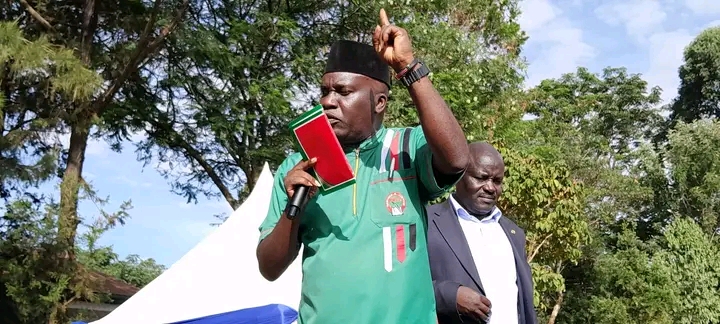By Charles Okoth
The scenario is pathetic. The Ministry of Education is almost at what can be seen as the forefront of killing the book industry; and, by extension, literacy. Whether knowingly or unknowingly, this is the situation in which the mandarins at Jogoo House ‘B’ have positioned themselves.
Observe: the ministry has instructed head teachers not to ask parents/students in their schools to buy class readers. The schools themselves have been instructed not to buy the same. This is a real paradox when most of the senior people in the ministry, including the chief executives, went through a system where having a termly class reader was the norm.
I recall my early years in school. I recall the small picture books we had in primary school. With a pang of nostalgia, and a keen craving, I recall titles of books I devoured with a profound intellectual gluttony; for I found the stories so absorbing and interesting and fascinating that I could scarce put them down. They shaped my personality; my world outlook.
Audu and the Bicycle. The Children of the Forest. Mweru the Ostrich Girl. Captured by Raiders. Kaburi Bila Msalaba. And the great Kiswahili classics by Leo Odera Omolo and Shabaan Bin Robert.
Then we had the astounding tales from Arabia: The Arabian Nights Entertainment; and their Kiswahili form: Hadithi za Alfu Lela Ulela. Ah, Sindbad the Sailor! Oh, Ali Baba. And my uncle’s repertoire in kiLuyia, Mundaalo Tsia Manani, which he later translated to English, In the Days of Dragons.
I could go on and on; but suffice be it to say that was a time of SOLID LITERATURE. Solid, four-dimensional characters. I am talking of storylines you could not forget. And characters who got seared in your mind as by a hot iron; a glue stickier by far than super glue.
I recall that when my father was a head teacher, he would collect the books for our school, from the AEO: the Area Education Officer. The books were bought by the government, and distributed to the local offices. Invariably, the first stop was our house, and I would have the privilege of being one of the first readers.
As they say, those were the days. At present, things have changed. Or to quote the Zimbabwean writer, Thingth have gone to the dogth.
Today, buying a storybook has been almost criminalized. A head teacher can actually be interdicted, and even sacked, for asking parents to buy one book. When calling letters are being sent to the form one students, they are forensically edited by education officers to ensure that any hint of a head teacher asking form ones to buy a storybook is not there. Insistence will amount to insubordination.
Petty, don’t you think? So, why do we talk about reading culture in our schools? If we cobble up policies that criminalize buying of novels/class readers, can we, in the same breath, talk about reading culture? Performance in languages? Enhancing communication skills, both written and verbal?
Previously, schools would get some money under the tuition vote head. Willing head teachers could spare some of the money to buy class readers, which they could put in the library. Many schools also had a language policy, whereby a student would be expected to have at least one book per year, or in some cases, per term. This way, a school would have some class readers.
The scenario now is that most of the tuition money remains at Jogoo House ‘B’. They in turn supply schools with text books. And how? Very generously.
Look at this: a form one student will have three textbooks in one subject. Times 11 subjects? 33. Very generous indeed, don’t you think? But how much sense does it make? Wouldn’t it be more sensible to give even two titles of, let’s say, Physics, and one storybook? And if we can give three titles per subject, can’t we reduce them two and buy even three storybooks per student?
What is the sense in giving three physics titles to a form three who has dropped physics? Does the ministry know that physics in an elective, and it is dropped by some of the learners? So, what is the sense in taking 900 physics books to a school with 300 form three students, when only 50 are taking physics? What happens to the other 750 books? That’s called wastage.
One other thing: does the ministry know that by killing the book industry, they are affecting lots of people who were earning from the industry? We are thinking of publishing houses which have had to close down. The staff, which was depending on the books for their livelihoods, have now had to suddenly find themselves jobless. The writers, who are custodians of the culture of a nation, now find that they cannot earn anything from their trade. All these thanks to a policy that seems bent on killing one of the most useful industries a nation has.
Yet, must we go this way? Must we, knowingly or unknowingly, kill the book industry? Is it for our national good?
One reason the ministry gives for refusing the idea of parents being told to buy books is that it is burdensome to parents. This is just as true as it is true that an insect’s feelers are a burden to it. Thin, but critical, the feelers cannot be termed a burden. Without them, a very important function of the insect is lost.
Surely, a parent can afford one book a year? I am thinking of one thousand shillings. Is this too much for a parent, especially if the government is now buying set books, and all other books? Of course, political expediency demands that populist policies be adopted, but is this one to the benefit or the detriment of learners and/or parents? And by extension, the nation at large?
I have this to say to our well-meaning Jogoo House ‘B’ mandarins: remove the throttling fingers from the book industry. Let it breathe. Let it be. Let parents who are willing to buy books, buy them. It is not a criminal offence; and buying a book never made a parent poor. Or anybody for that matter. And as spenders of tax money, boost the book industry. That will be money well spent; instead of buying several copies of text books from specific publishers. That will necessarily cause eyebrows to rise.
Okoth is a retired high school teacher based in Busia






